Shipyard named after 61 communard. The Kazarsky case - 1
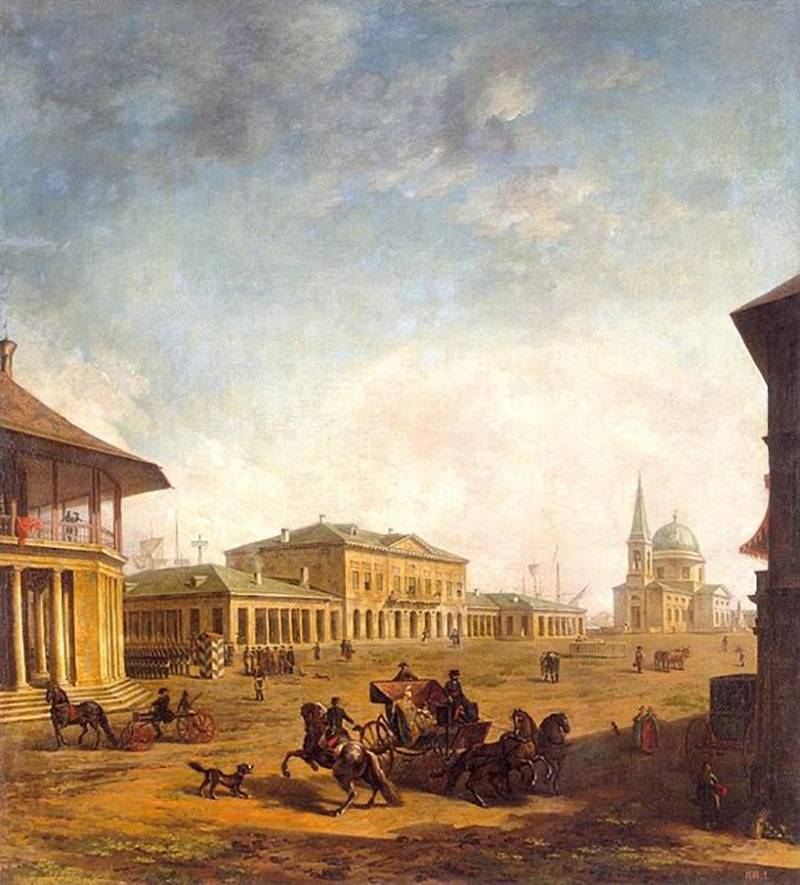
However, with all the undoubted and obvious advantages, the Greig period is also characterized by other, much less positive processes and facts. Away from the centers of state and fleet control, juicy weeds in the wastelands of the southern outskirts of the empire flourished with a dry official letter designated as abuse of official position and using it for their own purposes. To put it simply, embezzlement and theft. Alas, it was not a local disease of the empire, like weeds overgrown by many of its regions and authorities. And yet the scale of what is happening on the Black Sea Fleet frightened its scope. Alarms coming from Nikolaev and Sevastopol, could no longer be unnoticed.
Admiral woman
Aleksey Samuilovich Greig did a lot not only to revive shipbuilding and bring the fleet in order. He showed great concern also with regard to the life of officers and lower ranks. The fact is that ships regularly arrived in Nikolaev in the fall for scheduled maintenance, which remained until spring. The lower ranks were sent to the barracks, the officers - to rented apartments.
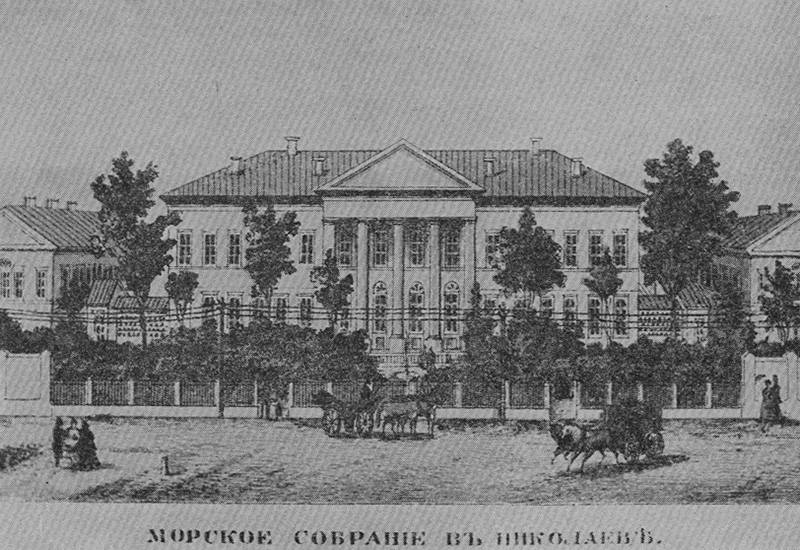
Remaining out of work gentlemen officers often indulged in the eternal vices of unhurried garrison life - drunkenness and all its derivatives. To direct the energy of the sovereign servants to a more peaceful course, in the 1824 year, by order of Greig, the Winter Maritime Assembly was built. There were regularly held balls of the provincial scale and other entertainment events of a decent nature.
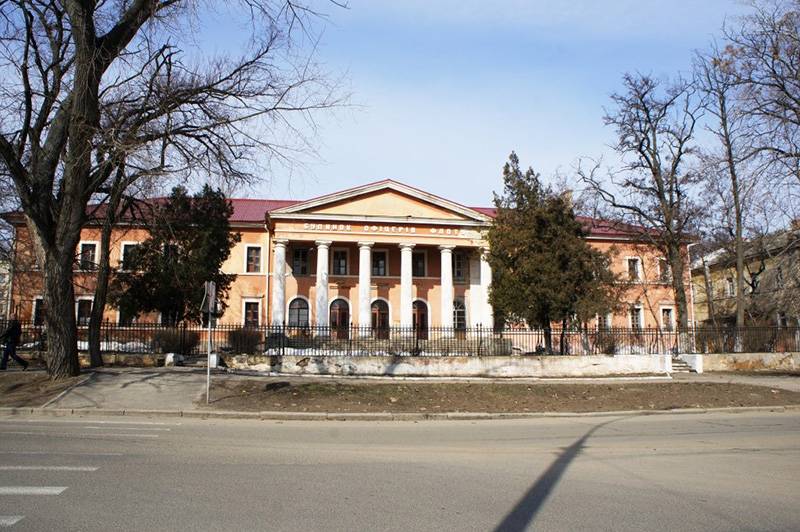
However, the personal life of Greig himself, despite his successful career, still did not take shape. Having taken the post of Chief Commander of the Black Sea Fleet, the admiral arrived in Nikolaev as a bachelor. An experienced sailor who spent half his life on the deck far from his native shores, Greig, according to his contemporaries, was, in the treatment of the opposite sex, “frankly timid” then. And here in his life, finally, there is a woman who could awaken passion from a sailor salted with life and sea waves. It happened in Nikolaev at the beginning of the 20s. and had quite significant consequences.
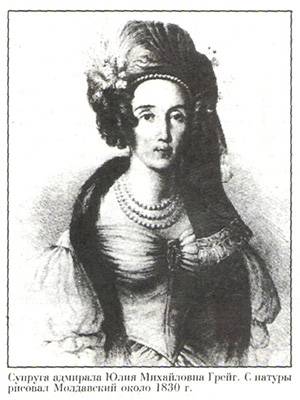
Lia Moiseevna Vitman (Stalin's) came from a family of innkeeper from Mogilev. Initially, she had nothing to do with either the fleet or Nikolaev. The career of the future favorite of the admiral and subsequently his common-law wife began with a modest post as a servant at the inn. This role was too insignificant for a young, energetic and ambitious person. Soon, Lia went into commerce, unsuccessfully along the way, marrying a certain captain Kulchinsky, with whom, however, she quickly divorced.
Drawn by interests of a financial nature, the former innkeeper arrived in Nikolaev, hoping to get, with the help of relatives, a lucrative contract for the supply of timber. It should be noted that in Nikolaev of that period there was not only a revival of shipbuilding processes, but also economic fuss was clearly marked. The Black Sea Fleet was a large structure with numerous institutions and departments. All this vast economy consumed considerable resources: wood, iron, hemp, canvas, food, cloth and a lot more.
The financial turnover of the fleet of that time was 8 – 10 million rubles. Petersburg provided enormous funds for the maintenance of infrastructure, ships, shipyards and the purchase of various materials. Persons who knew a lot about affairs, and not only financial ones, who could smell the money at an impressive distance, began to fly to Nikolaev. The periphery of the Admiralty was overgrown with a conglomerate of financial and trading houses, offices and desks.
Arriving in the city, Lia Moiseevna, instantly assessing the situation, decided to knock out a profitable contract for himself. Like the divisions of the corps of Marshal Davout, with a swoop trying to take Bagration flash, Madame Wittman attacked the Black Sea Admiralty Department with no less onslaught. However, the defense in this department was held not by beardless recruits, but by professionals hardened in fights with contractors. The attacks of Lia Moiseevna were repulsed. But it was not such Madame Whitman, to retreat at a time when the laurel wreath of the winner was almost felt in the resin of the curls.
Not having achieved success in a frontal attack, the businesswoman began to look for workarounds using relatives. Through her sister's husband, Lia Moiseevna was able to find the secret path to the reception room of Greig himself. Having an audience, she broke into the commander of the Black Sea Fleet, like a corsair brigantine on a raid of a sleepy Spanish colonial town. Perhaps Madame Whitman was counting only on obtaining a profitable contract, but during the operation her plans changed. In the end, she concentrated her efforts on the strategic source of her wealth, which at that moment was a forty-five-year-old and, besides, single Aleksey Samuilovich Greig.
The admiral, to whom the twenty-year-old temperamental beautiful girl made the strongest impression, was eventually forced to "lower the flag" and take on board the "prize team". The trouble for Greig and for the Black Sea Fleet was that not only the former innkeeper, but also her numerous relatives, friends and acquaintances were among this “prize team”. Leah became a frequent guest at Greig's home and soon smoothly relocated to the position of his housekeeper. But the intermediate result, even though it seemed attractive, could not satisfy the young lady with sober calculation.
In a short time, Madame Whitman-Stalin becomes de facto wife of Greig. She was not an ordinary hunter of lush title, golden epaulettes and all the pleasant derivatives of it. Lia Moiseevna was able to serve herself well, she had refined manners and charm. In the provincial Nikolaev wilderness she could not have fit the velvet skin of a socialite.
Under her patronage in the admiral's house, a kind of salon soon began to function successfully, where the first guests were often young officers, then officials, the urban elite, and all those whom it was commonly called "the right people." Gradually, revealing the direction of the wind, the civil wife of Greig began to keep the balance and officer wives and spouses of officials. And all this could not go beyond the usual at all times love stories a mature man with a high position and a pragmatic young person with a dubious past, if not for one significant circumstance.
Lia Moiseevna tirelessly tried to ensure the well-being of not only her modest person, but also the frighteningly increasing in the ranks of the legion of relatives, friends and just good people. Rumors that Admiral Greig had a life partner, albeit unofficial, but fully capable of successfully resolving issues of a commercial and financial nature, quickly spread around the Novorossiysk Territory. The admiral, being deeply impressed by his girlfriend, did not pay attention to her vigorous business activity. And if he did, he closed his eyes to her.
Thanks to the efforts and patronage of Madame Vitman-Stalinskaya, the most profitable contracts for the supply of timber, supplies, hemp and other necessary materials began to fall into the hands of "good and honest business people." The financial environment also revived: in 1821, in Nikolaev, a Loan Bank was established with an initial capital of 240 thousand rubles. It was created at the initiative of Admiral Greig, and he also became its first chairman, combining the management of the bank with the command of the Black Sea Fleet.
Midshipman Dahl's Epigram
For the sake of justice, it is worth noting that not all were delighted and affection from the affairs that were turned in and around the admiral's house. The Governor-General of Novorossiysk and Bessarabian Count Mikhail Semenovich Vorontsov, with whom Greig was not in the best of relations, did not hide his critical attitude to what was happening. It’s no secret that during Vorontsov’s infrequent visits to Nikolaev, the admiral tried to prevent Liya Moiseyevna from seeing his influential neighbor.
Business activity of the admiral's civil wife became the subject of discussions and comments of the witty and far from always politically correct naval officers of Nikolaev. Many conversations, jokes, bikes did not go beyond the external raid of mess-rooms and smoking rooms, but something became public knowledge.
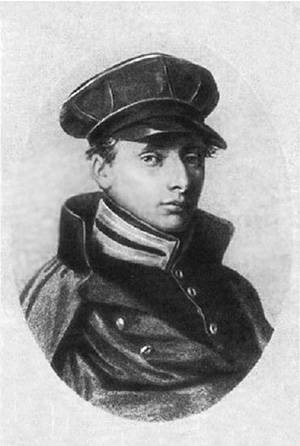
In the 28 fleet crew served a young talented midshipman Vladimir Dal. The future compiler of the Explanatory Dictionary of the living Great Russian language was a budding officer and excellent wit. It is not known exactly what inspired Dahl. Whether another story about the skillful combinations of the housekeeper of the admiral and her friends. Whether a mockery of Greig himself, who showered Madame Whittman with various preferences, such as, for example, a house in the center of the city. However, in the fall of 1823, a dangerous stinging epigram began to circulate among the residents of Nikolaev. In her, without any notes, the personality, activity and nationality of Madame Vitman was analyzed, and with respect to her patron a definition such as “stupid cuckold” was used.
When the content of this work reached Alexey Samuilovich, eyewitnesses witnessed the manifestation of uncomplicated Scottish rage. The admiral, whose honor and self-esteem were struck at the very waterline, ordered the rights of the governor to identify the author of the ill-fated epigram. Nikolaev is a small town, and at that time it was a little small, and state guests soon came to visit the midshipman Dal. For completely random circumstances, a draft with a written poem was discovered by the city police chief. Dal's 1823 was arrested in September.
Greig did not want to let things go on the brakes, and the military court took up the midshipman-pamphlettist. The trial lasted a whole year, during which Vladimir Ivanovich was repeatedly interrogated in order to find out the reason for the misdeeds on the admiral's favorite. Michman kept confidently and firmly and ultimately did not admit his guilt. Dahl only agreed with the authorship of another verse, written by him in defense of the Italian language teacher in the Nikolaev navigator company - the provincial secretary Alexander Danzhelo Maraki. It also mentions the name of the notorious Madame in a rather impartial form.
As a result, the midshipman was demoted to sailors for a period of six months with the accompanying wording "for writing libel." Dal did not want to put up with the circumstances in this form and wrote a letter to the emperor. The sentence of the Black Sea Court was considered by the Maritime Audit Department, which found it overly harsh for such a misdemeanor, belonging to the category of “youthful pranks”. The case of offensive writing for Greig was clearly bloated, and as a result the Maritime Audit Department did not approve the verdict and, having honored Dal for more than 8 months in custody as a perfectly acceptable case, ordered the transfer of the midshipman to the Baltic Fleet. In the summer of 1824, Dahl transferred to Kronstadt for further service.
However, Greig's pride was too hurt to simply forget the hurt caused to him by oblivion. The admiral for the old service had enough powerful friends, and it’s quite possible that Liya herself whispered a few words to who should. The service at the new place at Dahl did not work, and he was forced to write a letter of resignation. He had to change profession, and he went to study at the doctor in Dorpat.
By the way, the story with poems to some extent loomed behind Dahl throughout his life. Only in the 1859 year, when the aged scientist went into full retirement, did the decree of the then Emperor Alexander II “not to consider as a further obstacle to receiving awards and advantages to the blamelessly filed case of“ writing of lampoons by midshipman Dahl ”.
Adjusted system
It is quite possible that Admiral Alexey Samuilovich Greig, a man, of course, talented and extraordinary, who did a lot for the Ingul shipyard, Nikolayev and the Black Sea Fleet, was only a blind tool in the hands of Leah and her entourage. To be fair, it should be noted that various concessionaires-nuggets and clever combinators at the headquarters of the Black Sea Fleet were enough even before its appearance. After all, the largest shipyard in the Northern Black Sea region is not only ships and people, but also many millions of government money. The money that can be under certain circumstances and talents from government to turn into private.
Lia Vitman quickly figured out the currents at the top of the Black Sea Fleet and harmoniously integrated into the existing schemes. Nobody would dispute her position under Greigue, and she would not dare. For some time, another letter appeared in her name, and now it sounded more familiar - Julia. In 1827, Yulia Mihailovna (now called Greig’s common-law wife) had a son.
The scale of the financial thefts and abuses that occurred in those years began to cause some concern in St. Petersburg. For the first time, Alexander I spoke about replacing the leadership of the Black Sea Fleet as early as 1820, planning to appoint Prince Alexander Sergeyevich Menshikov personally loyal to him. Admiral Greig was in his position for four years and showed good results. It is likely that the sovereign's hesitations were caused by the widely publicized story with Yulia Mikhailovna. However, at that time a personnel reshuffle was not given for various reasons. The sovereign received the first signals about the upcoming conspiracy in the guard, and he had something to think about.
Nicholas I, who replaced him on the throne at the beginning of his reign, had enough trouble and didn’t get to fight corruption. The uprising on Senate Square was soon replaced by the war with Persia 1826 – 1828. and the Ottoman Empire 1828 – 1829 Then there was a large-scale uprising in the Kingdom of Poland. Only at the beginning of 30's. Nicholas I got his hands on the situation in the Black Sea Fleet.
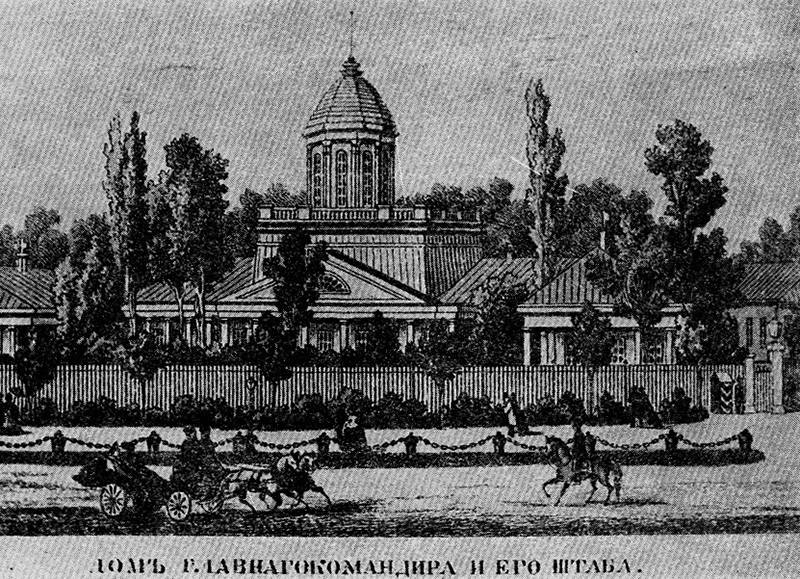
Despite previous and considerable merit, Greigom in St. Petersburg was unhappy, considering his leadership of the fleet during the 1828 – 1829 war. overly cautious. However, it was not only a matter of caution - all the more insistent requests of the Black Sea Fleet commander for additional funds were suspicious. Greig simply insisted on the transfer of contracts for the construction of part of warships in the hands of private capital, mainly from Odessa and Kherson.
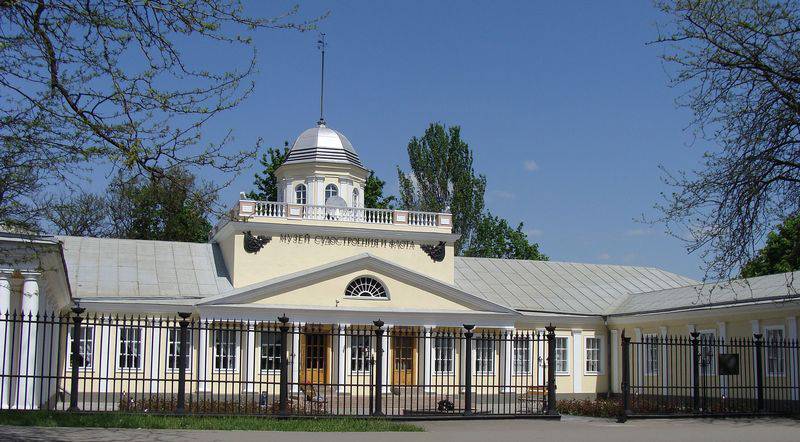
The question arose: what are the expenditures increasing in size being spent on, if state-owned shipbuilding is in place, and only private entrepreneurs can build ships? Signals came from other sources, including from Count Vorontsov. Greig's office needed a thorough check - thorough and unbiased. A man of exceptional honesty and courage could cope with such a task. The emperor had such a man. He was his adjutant, hero of the war 1828 – 1829, captain of the 1 rank Alexander Ivanovich Kazarsky.
To be continued ...
Information